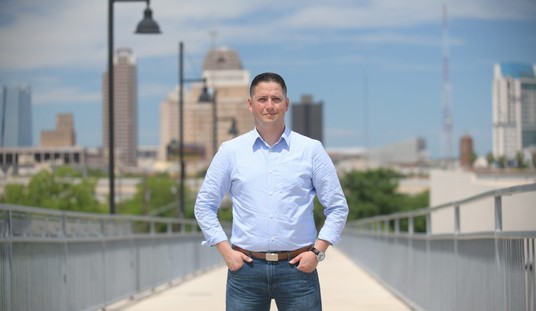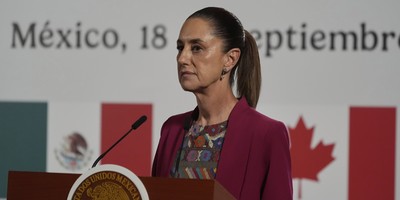The College of Cardinals of the Catholic Church has begun the conclave in Rome to elect the next pope. At this writing, the first vote has already been taken (without producing a replacement for the recently deceased Pope Francis), and by the time this column is published, the second vote will have been completed as well. Whether or not the conclave will have chosen a new pope before my column appears in print, it is worth considering what the church -- and the world -- needs in the next pontiff.
The pope of the Roman Catholic Church is said to sit on the Throne of St. Peter; the successor of the man to whom Jesus Christ said, "Thou art Peter, and upon this rock I shall build My Church, and the gates of Hell shall not prevail against it" (Matthew 16:18). Two thousand years of history have since been filled with the political machinations and intrigues of Catholic popes (and lesser clergy) in the affairs of state of Europe, the Middle East and South America, not to mention other nations and territories around the world. Indeed, the Pilgrims and Puritans who fled to what became the United States of America did so to be able to practice their faith without fear of the religious wars and political persecution of Protestants and Catholics alike that had become rampant in Europe.
In the modern era, some popes have certainly been more politically engaged than others. Pope St. Pius X decried "modernism" in all its forms, political and religious, while Pope Pius XII has been accused of not being "political" enough, and failing to condemn the Nazi slaughter of millions of European Jews. Pope St. John XXIII convened Vatican II, the council that significantly modernized Catholic liturgy and practice, but it was his successor, Pope St. Paul VI, who presided over Vatican II, despite being a quieter, less overtly political figure. Pope St. John Paul II had strong political views, having grown up in then-communist Poland, and played an enormous role in resistance to communist regimes around the world during his pontificate, while Benedict XVI, who followed him, was more scholarly and contemplative.
Recommended
So, it is probably pointless to hope that the next head of the Catholic Church will be apolitical. But perhaps it is not too much to hope that he will be better informed and less careless than his predecessor, Pope Francis.
Among Francis' greatest skills was his ability to connect with individuals on the margins of society; his 12-year pontificate included many moments that showed Francis' great love for the disabled: his embraces of Vinicio Riva, a man suffering with horrible disfiguring neurofibromatosis; of Dominic Gondreau, an 8-year-old with cerebral palsy, and of Everly Tshakapesh, a baby with 3M syndrome, are just three examples.
But Francis' affinity for speaking off the cuff, coupled with his decidedly left-leaning views on some of the most contentious issues of our time, tended to create the impression that his personal beliefs about -- for example -- anthropogenic climate change and free-market capitalism were matters of Catholic dogma. This was no doubt exacerbated by widespread ignorance about the doctrine of papal infallibility. (Popes are only considered "infallible" when they speak ex cathedra on matters of faith and morals. Every opinion a pope expresses is not considered infallible, nor does it oblige agreement or obedience by the faithful.) Furthermore, some of his opinions were scientifically questionable and morally inconsistent, to say the least. Notwithstanding his papal encyclical on the environment, "Laudato Si," there is significant scientific disagreement about whether human activity is a primary driver of climate change. And government mandates of COVID-19 inoculations were already problematic from the standpoint of human rights; that some were derived from cell lines of aborted fetuses was yet another legitimate reason for persons of faith to decline them.
Still, even some progressives who considered Pope Francis to be brave and forward-thinking believe his papacy did not go far enough. As it always has, the world wants religious leaders who play by earthly rules. Thus, many hope that the next Catholic pope will be even more "progressive" and more "modern," will validate deeply felt personal choices about sexuality, gender, contraception and divorce, and will yoke his message to the popular political policies of the day.
But what the Catholic Church (and the world) needs is a pope who is truly brave. That means a man who is humble enough to proclaim not "your truth" or "my truth" but Christ's Truth, and one who understands that the pope's primary responsibility is not earthly politics but individual salvation. He is to be, to use the common expression, "in the world, but not of it."
In that vein, we can consider the words of two leaders among modern-day Catholic clergy.
Cardinal Robert Sarah of Guinea -- considered by some to be papabile, or a serious contender to be elected pope -- has said: "The Church is not a humanitarian organization; she is not an NGO. The Church is not a political party; she is not an ideology. She is the continuation of Christ."
And while "inclusion" is a popular contemporary buzzword, it means not unconditional acceptance but something else entirely in the context of Christianity. American Bishop (and bestselling author) Robert Barron was paraphrasing Cardinal Francis George, former president of the United States Conference of Catholic Bishops, when he wrote, "As Cardinal George once put it, commenting upon the famous liturgical song 'All Are Welcome,' all are indeed welcome, but on Christ's terms, not their own."
May the work of the conclave produce a leader with the proper understanding of his mission.
























Join the conversation as a VIP Member